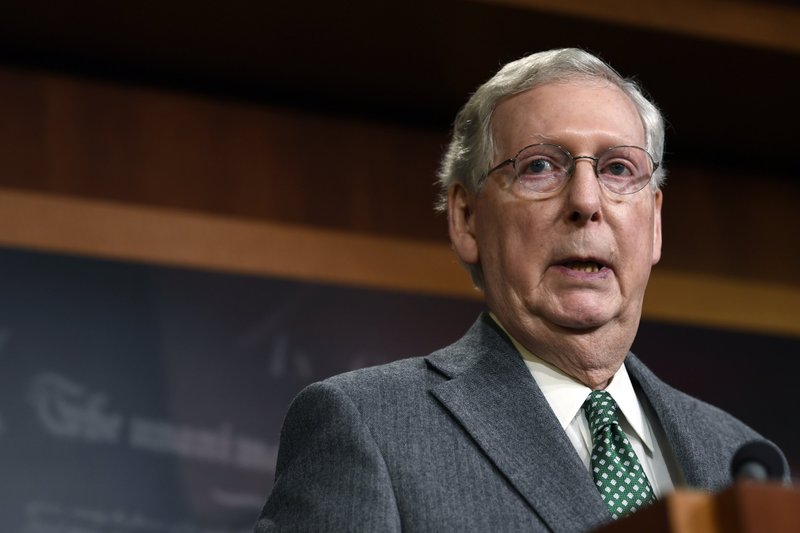WASHINGTON -- The Senate majority leader said that if there's a vacancy on the Supreme Court during next year's election cycle, the Republican-controlled Senate would likely confirm a nominee selected by President Donald Trump.
In an appearance Tuesday in Paducah, Ky., Sen. Mitch McConnell told a questioner that if a Supreme Court justice died next year, creating a vacancy on the nine-member court, "Oh, we'd fill it."
The comments by the Kentucky Republican appeared to mark a reversal from his stance three years ago, during President Barack Obama's final year in office, when he blocked hearings on Obama's choice of Merrick Garland to replace the late Justice Antonin Scalia. At the time, McConnell said that the choice should be left to voters in an election year.
The majority leader called his decision to block Garland's nomination "the biggest decision I've made in my time in the Senate with the longest impact on the country," according to a recording of McConnell's comments Tuesday.
The vacancy created by Scalia's death was filled by conservative Neil Gorsuch while swing vote Anthony Kennedy, who retired, was replaced by Justice Brett Kavanaugh last year.
Senate Democratic leader Charles Schumer of New York said McConnell was a "hypocrite" and tweeted that his colleague "lives for GOP judges because he knows the GOP agenda is so radical & unpopular they can only achieve it in courts."
Rep. Hakeem Jeffries, D-N.Y., the fifth-ranking House Democrat, called McConnell "a shameless individual" and accused him of "stealing a Supreme Court seat that Barack Obama had the right to present to the American people."
McConnell spokesman David Popp said McConnell was being consistent because he took care in 2016 to say that vacancies occurring when the White House and Senate are held by different parties should be held up. Republicans now control the Senate and White House.
"You'd have to go back to 1888 when Grover Cleveland was in the White House to find the last time a vacancy created in a presidential year was confirmed by the party opposite the occupant of the White House," McConnell said in March 2016, a month after Scalia died.
In 1895 a Republican-led Senate confirmed Rufus W. Peckham after he was nominated by Cleveland. Since then, Democratic-controlled Senates have approved 13 nominees by Republican presidents.
Before 2016, there had been just seven election-year confirmation battles since the beginning of the 20th century. In the most recent case, Kennedy, who was appointed by President Ronald Reagan, was confirmed in 1988 by a Democratic Senate in a 97-0 vote after a grueling seven-month process.
The only time a Senate has failed to confirm a nominee in an election year was 1968, when the nomination of Abe Fortas was withdrawn. Both the Senate and the White House were controlled by Democrats at the time.
There is no announced vacancy and no justice has made moves indicating they're about to leave, but two of the current justices are in their 80s, and one of them, Justice Ruth Bader Ginsburg, 86, has suffered a series of health problems. There has also been Internet chatter that Justice Clarence Thomas, the current court's longest serving justice, would consider retirement if his seat could be filled by a Trump-named younger conservative. Thomas was appointed by President George H.W. Bush, a Republican.
The Senate has approved more than 100 federal judges since Trump took office, including two Supreme Court justices and 41 appeals court judges.
In McConnell's remarks in Paducah, he said that legislative accomplishments such as tax reform could be undone by future administrations, but that Supreme Court confirmations could have a more lasting impact.
"What can't be undone is a lifetime appointment to a young man or woman who believes in the quaint notion that the job of a judge is to follow the law," he said. "That's the most important thing we've done for the country, which cannot be undone."
Information for this article was contributed by Andrew Taylor and Matthew Daly of The Associated Press; by Daniel Victor of The New York Times; and by Mike Stunson of the Lexington Herald-Leader.
A Section on 05/30/2019
